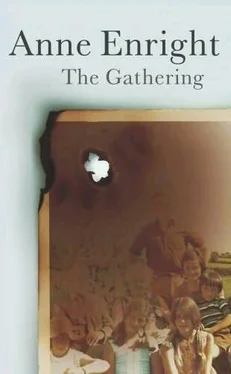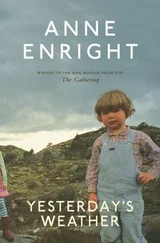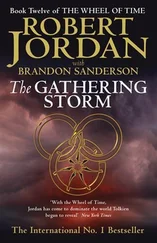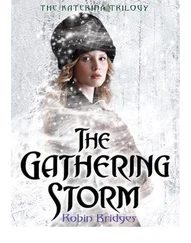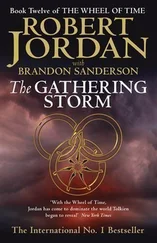There is saliva falling from my mother’s bottom lip now, in gobs and strings. Her mouth keeps opening. She keeps trying to close it but her lips refuse to stay shut and, ‘Gah. Gah,’ she says.
I must go over and touch her. I must take her by the shoulders and lift her gently up and away. I will squeeze her arms back down by her sides as I push and guide her to a chair, and put sugar in her cup of tea, though she does not take sugar. I will do all this in deference to a grief that is biological, idiot, timeless.
She would cry the same for Ivor, less for Mossie, more for Ernest, and inconsolably, as we all would, for the lovely Jem. She would cry no matter what son he was. It occurs to me that we have got something wrong here, because I am the one who has lost something that can not be replaced. She has plenty more.
There were eleven months between me and Liam. We came out of her on each other’s tails; one after the other, as fast as a gang-bang, as fast as an infidelity. Sometimes I think we overlapped in there, he just left early, to wait outside.
‘Are you all right, Mammy? Will you have a cup of tea?’
She eyes me: very tiny, in the big chair. She gives me a narked look and her head twitches away. And it comes down on me like a curse. Who am I to touch, to handle and discard, the stuff of a mother’s love?
I am Veronica Hegarty. Standing at the sink in my school uniform; fifteen maybe, sixteen years old; crying over a lost boyfriend and being comforted by a woman who can not, for the life of her, remember my name. I am Veronica Hegarty, thirty-nine, spooning sugar into a cup of tea for the loveliest woman in Dublin, who has just had some terrible news.
‘I’m just going to ring Mrs Cluny.’
‘Ring her?’ she says. ‘ Ring her?’ Because Mrs Cluny only lives next door.
‘Yes, Mammy,’ and she suddenly remembers that her son is dead. She checks again to see if it could be true and I nod in a fake sort of way. No wonder she doesn’t believe me. I hardly believe it myself.
THE SEEDS OFmy brother’s death were sown many years ago. The person who planted them is long dead-at least that’s what I think. So if I want to tell Liam’s story, then I have to start long before he was born. And, in fact, this is the tale that I would love to write: history is such a romantic place, with its jarveys and urchins and side-buttoned boots. If it would just stay still, I think, and settle down. If it would just stop sliding around in my head.
All right.
Lambert Nugent first saw my grandmother Ada Merriman in a hotel foyer in 1925. This is the moment I choose. It was seven o’clock in the evening. She was nineteen, he was twenty-three.
She walked into the foyer and did not look about her and sat in an oval-backed chair near the door. Lamb Nugent watched her through a rush of arrivals and instructions as she removed her left-hand glove and then picked off the right. She pulled a little bracelet out from under her sleeve, and the hand that held the gloves settled in her lap.
She was beautiful, of course.
It is hard to say what Lamb Nugent looked like, at twenty-three. He has been in the grave so long, it is hard to think of him innocent or sweating, when all of that is gone to dust.
What did she see in him?
He must be reassembled; click clack; his muscles hooked to bone and wrapped with fat, the whole skinned over and dressed in a suit of navy or brown-something about the cut of the lapels, maybe, that is a little too sharp, and the smell on his hands would be already a little finer than carbolic. He had it down, even then, the dour narcissism of the ordinary man, and all his acts of self-love were both subtle and exact. He did not preen. Lamb Nugent watched. Or he did not watch so much as let it enter into him-the world, in all its nuance of who owed what to whom.
Which is what he saw, presumably, when my grandmother walked in through the door. His baby eyes. His two black pupils, into which the double image of Ada Merriman walked, and sat. She was wearing blue, or so I imagine it. Her blue self settled in the grey folds of his brain, and it stayed there for the rest of his life.
It was five past seven. The talk in the foyer was of rain, and what to do with the jarvey and whether refreshments would be required; after which the knot of arrivals was pulled in a string through the front lounge door, and the two servants were left behind to wait; she in her neat chair, he with his elbow on the high reception desk, like a man standing at a bar.
In which position, they stayed for three and a half hours.
They belonged to the lower orders. Waiting was not a problem, for them.
Ada did not pretend to notice him, at first. This may have been the polite thing to do, but also I think he would have had it from the start, this trick of not existing much. And the rages he suffered in later life must have been, in 1925, the usual run of passions and young hopes. If Nugent suffered from anything, in those early days, it was decency. He was a decent man. He was not a man much used to hotels. He was not used to women who showed such twitching precision in the way they worked a glove. There was nothing in his history to prepare him for Ada Merriman. But, he was surprised to find, he was ready for her all the same.
Behind the high desk, the little concierge hung a key on his board, then clicked away to check a bell. He came back to the desk, wrote a note, and left again. A maid came out of the back kitchen carrying tea on a tray. She mounted the stairs and turned on to an upper corridor and never came back down. They were alone.
Such discretion. Because Dublin was full of proud women as well as decent men, and you could be loud about it or you might, like this pair, be easy and silent. And in the quietness of their attention they each realised the strength of the other and the fact that neither would be the first to walk away.
There are so few people given us to love. I want to tell my daughters this, that each time you fall in love it is important, even at nineteen. Especially at nineteen. And if you can, at nineteen, count the people you love on one hand, you will not, at forty, have run out of fingers on the other. There are so few people given us to love and they all stick.
So there is Nugent, stuck to Ada Merriman before the clock strikes the quarter-hour. And she to him, by implication-although she does not know it yet, or does not look as if she knows it. Meanwhile, the light fades and nothing happens. The maid who never came back downstairs comes through the foyer with another tray and she mounts the stairs again and disappears one more time into the dark of the top corridor. In the room behind the reception desk they hear someone open a door and enquire after a Miss Hackett. And Ada Merriman looks into the respectable middle distance, where Lamb Nugent does not believe a single word she says.
The air between them is too thin for love. The only thing that can be thrown across the air of Dublin town is a kind of jeering.
I know you.
But it is too late for all that. It has already happened. It happened when she walked in the door; when she looked about her, but only as far as the chair. It happened in the perfection with which she managed to be present but not seen. And all the rest was just agitation: first of all that she should notice him back (and she did-she noticed his stillness), and secondly that she should love him as he loved her; suddenly, completely, and beyond what had been allocated to them as their station.
Ada reads him with the side of her face; the down on her cheek bristles with all that she needs to know about the young man who is standing on the other side of the room. It is the beginning of a blush, this knowledge, but Ada does not blush. She looks at her bracelet: a narrow chain in rose gold, with a T at the clasp, like the fob of a watch. She fingers this small anomaly-a male thing on her girl’s wrist-and feels Nugent’s disbelief weigh against her. Then she lifts her head very slightly to say, ‘So?’
Читать дальше
